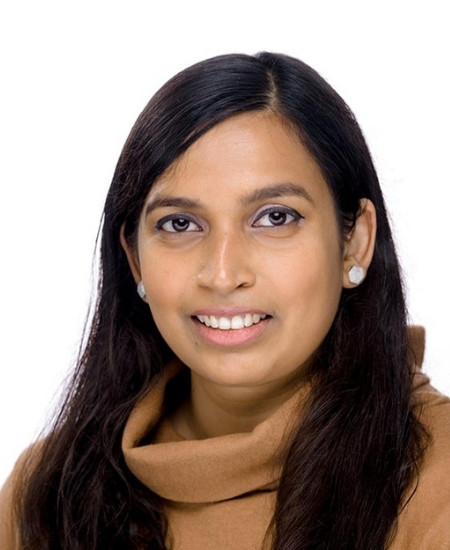The Geoffrey F. Bruce Fellowship in Canadian Freshwater Policy 2020 Recipients
Recipient profiles

Caroline John is a Master’s candidate in Toronto Metropolitan University’s Environmental Applied Science and Management program. Caroline came to the university with a Bachelor of Science degree in Geology from the University of New Brunswick and several years of work experience in Ottawa with environmental and community-oriented non-governmental organizations. She has contributed to environmental research and advocacy projects for Environmental Defence; Climate Action Network Canada; Sierra Club Ontario Chapter; Urban Shades Community Garden; and Permaculture Ottawa. Caroline’s interest in graduate studies and research on the environment and water policy originates from these experiences.
Caroline’s research focuses on groundwater policy and governance in Ontario. Groundwater is a policy challenge across the globe as it is an ‘out of sight, out of mind’ arena of water policy. Global organizations such as the International Association of Hydrologists, the World Bank, and the Food and Agriculture Organization of the United Nations have shown in their Groundwater Governance: A Global Framework for Action that two key aspects of tackling groundwater management challenges involve addressing public awareness and well as developing and disseminating best practices for governance and policy solutions.
In Canada, 8.9 million people, some 30% of Canada’s population, rely on groundwater. In Ontario, 29% of the population depend on groundwater. Despite the significance of groundwater in many communities, water governance scholars and advocates find that groundwater is a neglected area of water policy.
Twenty years after the Walkerton Tragedy in Ontario, and subsequent water policy reforms in the province, significant groundwater governance and policy challenges remain. Caroline’s research aims to investigate the narratives surrounding groundwater water policy in Ontario. Using media framing analysis, Caroline is examining the significance of groundwater to several communities in Ontario and how media coverage frames groundwater issues. Her project is a longitudinal and in-depth study covering the period from May 2000 to June 2019 and investigates how local and national newspapers cover and frame groundwater issues in Ontario. In addition to her examination of how media frames groundwater issues and policies, her research documents, examines and assesses Ontario’s development of laws and policies related to groundwater over the same period. These two stages of content analysis will allow for a comparison of groundwater issues and challenges faced in communities and assessment of the current groundwater policy regime in Ontario.
Her interdisciplinary research project on groundwater issues and policy in Ontario will make an important contribution to an under-researched topic in Canadian freshwater policy. She hopes the findings will be relevant for policymakers in Ontario, the Great Lakes region, other provinces, the Canadian Council of Ministers of the Environment, and the Canadian federal government.
The Geoffrey F. Bruce Fellowship in Canadian Freshwater Policy provides support for her to focus on data collection and analysis as well as to produce findings that she can disseminate to water policymakers in Ontario and beyond. In addition to generating her Master’s thesis, she hopes her research will generate results and recommendations that she can publish in a journal article and policy report.

Edward (Evan) Millar is a PhD candidate in the university’s Environmental Applied Science and Management program. Edward came to the university with an MA in Communication and Culture from York University and a BA in English from McGill University. His PhD research focuses on participatory water monitoring programs in Ontario and citizen science.
Citizen science is an increasingly important strategy for monitoring water quality in Ontario. Across the province, many localities are implementing community-based aquatic and water quality monitoring programs to fulfil a variety of their core mandates including: the collection of baseline water quality data; ecosystem health checks; tracking the impact of pollutants, and assessing the impact of land use and climate change on water systems. Citizen science has often been theorized as a new approach to environmental governance, shifting from technocratic decision-making and policy implementation to deliberative governance based on citizen engagement. With origins in the environment and ecosystem health movement, activist science organizations like Science for the People, promote citizen science as a method to incorporate lay expertise into environmental management and watershed governance. While citizen science offers a path to strike a balance between calls for public participation in water governance and a recognized need for ongoing monitoring, existing research often takes a celebratory tone. Enthusiasm for citizen science at a policy level is justified by the logic of cost-effectiveness and efficiency, with volunteers sometimes serving as free labour conducting work for which funding no longer exists to pay professionals. Citizen science can have important policy benefits, but there are concerns related to data collection and management, variability in efforts and capacity across the province, and a lack of policy capacity to support high quality, sustainable citizen-based monitoring activities. Further research is required to more fully examine the role of citizen science in water policy and explore the socio-political context in order to critically assess the role that this approach is currently playing in addressing water policy issues in Ontario.
Edward’s research focuses on gathering quantitative and qualitative data from comprehensive sources using interviews, participant observation, and content analysis of publicly available documents to analyze the sociopolitical dimensions of community-based aquatic ecosystem and water quality monitoring programs in Ontario. His research focuses on data collection from five groups of participants involved with citizen science: 1) civil servants employed in environmental management; 2) scientists involved in water monitoring; 3) volunteers involved in citizen science with an aquatic focus; 4) representatives from industry in the water sector and natural resource firms that draw from the water table or the aquatic ecosystem; and 5) activists involved in the water justice movement. His research investigates how different participants define their objectives related to water monitoring and assess citizen science as a means to achieve water policy goals.
Edward’s research to date has resulted in several publications: “The presence of citizen science in sustainability reporting,” Sustainability Accounting, Management, and Policy Journal, Volume 10(3) (co-author Dr. Cory Searcy); “The ‘cottage effect’ in citizen science: spatial bias in aquatic monitoring programs” International Journal of Geographical Information Science, 33:8, 1612-1632, (co-authors Stephanie Melles and Emily Hazell); as well as a forthcoming book chapter “Mapping Boundary Work in Citizen Science,” in Judge, E., Solomum and S., Bush, D., eds Locating Power and Justice in the Geoweb (University of British Columbia Press).
Funding as a Geoffrey Bruce Fellow in Canadian Freshwater Policy will allow Edward to finish his dissertation research and assessment of citizen science water monitoring programs in Ontario. The funding will also allow him to publish some of his findings in a policy report.